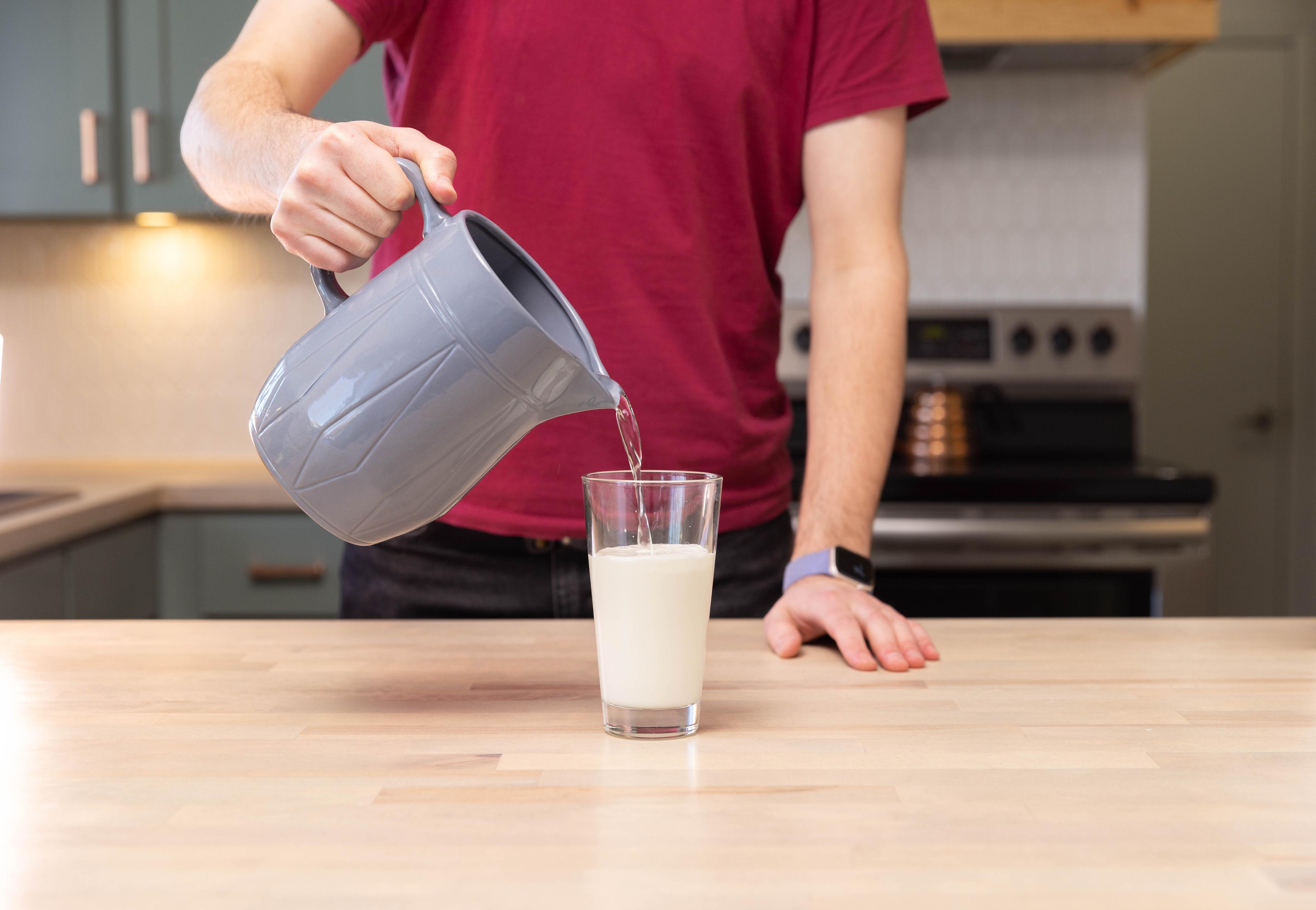
Food
What Is This About Cow’s Milk Hydrating Better Than Water?
It’s no surprise that milk is beneficial to hydration, but how beneficial?
The answer may blow what you know about beverages out of the water.
We know that staying hydrated is one of the most important things we can do to support our overall health — especially since dehydration is linked to a slew of unsavory outcomes, including feeling sluggish, having dry skin and experiencing negative effects on our heart health.
Unfortunately, it is estimated that 75% of Americans are chronically dehydrated, putting people across the nation at risk for experiencing some, if not all, of these unwanted effects.
While water is a common go-to sip, whether it be in easy-to-grab plastic water bottles or through the personal water bottle craze, it may not be the most hydrating drink out there. The option that may be your best bet might come as a big surprise!
Milk, Water and Hydration — Is There a Link?
Organic dairy milk is a No. 1 choice for dunking cookies and splashing over your morning cereal. But besides this, many Americans give up milk after a certain age, as they no longer see the benefit of drinking it. However, a study published in The American Journal of Clinical Nutrition suggests that milk does more than provide essential nutrients — it hydrates better than water. Yup, it may even be a better choice than a glass of H2O!
To conduct this study, researchers had people drink 1 liter (about 34 ounces) of different beverages including water, tea, orange juice, full-fat milk and skim milk over a 30-minute period. The researchers evaluated how much fluid was retained 4 hours later, helping them better determine which drink resulted in the best hydration.
They found that, among all of the drink choices that were used in the study, hydration status was best after drinking both skim and full-fat milk, or a sports drink — outperforming plain old water.
This isn’t the first study that showed the hydrating effects of milk. One study showed milk to be an effective post-exercise rehydration drink for athletes. And another study evaluating the hydrating potential of dairy milk and electrolyte beverages found that milk-based drinks are more effective rehydration options than traditional sports drinks.
Why Is Hydration So Important?
Before digging into how milk specifically supports hydration, it is important to understand why hydration is a priority. Sure, being hydrated helps keep the natural feeling of thirst at bay. However, there are numerous reasons why supporting your hydration status is incredibly important:
Energy Support
Being dehydrated can leave a person feeling sluggish and lethargic. Instead of grabbing an energy drink or a cup of caffeine-packed coffee to give that morning boost, simply drinking enough fluids (like milk) can give you a natural and often surprising lift that will propel you through the day. Why is this, you ask? It’s simple: The body is approximately 60% water — and as the brain uses the most energy of any organ, you need fluids to fuel its function!
The U.S. National Academies of Sciences, Engineering and Medicine estimates that an adequate daily fluid intake is approximately 15.5 cups for men and approximately 11.5 cups for women. Fluid includes water, other beverages and foods that provide hydration, like watermelon and cucumber.

Digestive Support
Inadequate fluid intake can cause digestive challenges. In fact, one of the first remedies for constipation relief is ensuring adequate hydration, as this factor helps lubricate the digestive system, enabling it to function properly. Adequate hydration should lead to consistent and productive bowel movements while highly caffeinated or sugary drinks often disrupt your natural bowel cycle and can lead to some, let’s say, uncomfortable results.
Improved Temperature Regulation
Having enough fluid in your body helps regulate your temperature. One factor that helps your body regulate its temperature is the very basic act of sweating. Although sometimes uncomfortable or embarrassing during hot summer months, sweating is the body’s natural AC. As a dog pants, so we sweat! Sweat, however, is directly dependent on how much fluid your body can “spare” in order to perspire. Should you stop sweating under a hot sun, it’s time to worry.
Helps the Body Get Rid of Waste
The above bullet points are, at their core, surrounding the idea of waste. Natural human waste, of course, includes urine, feces and sweat, and when the body is dehydrated, it may make it difficult for the body to rid itself of these toxins. If these contents aren’t excreted naturally, this can lead to a host of health issues — and in some cases these issues can be severe, such as heatstroke, severe constipation or kidney infections due to dehydration.
Weight Management
Many factors play into a person’s ability to manage their weight, including their dietary choices and family history. And along with these factors, some evidence suggests a link between hydration status and the body’s ability to break down fat.
Because of this, being dehydrated may work against your weight loss goals, while being hydrated may help you on your quest to lose weight and improve overall health. This is not to mention how much more full you feel when you drink fluids before and during your meal, which may aid some people in indulging in smaller portion sizes or to avoid mindless snacking throughout the day.
Why Milk Can Hydrate Your Body
Dairy milk may not be top-of-mind when it comes to selecting a hydration solution. But there are quite a few reasons why this drink is a powerhouse when it comes to hydration support:
Milk Contains Electrolytes
Humans have consumed dairy milk for thousands of years — and for a reason. It is a natural source of electrolytes, or nutrients that are important to our bodies for keeping the fluid in our body where it needs to be. Specifically, milk contains sodium, potassium, calcium and magnesium, all of which are electrolytes that are critically important for maintaining a healthy hydration status.
Milk Contains Natural Sugar
Dairy milk contains natural sugar in the form of lactose. But unlike fruit juices, colas and some oral rehydration solutions which can contain large quantities of added sugars (up to 34 g per drink, as seen in this article about popular drinks), milk contains just enough natural sugar to help support hydration without overwhelming the body.
The right amount of sugar (aka glucose) helps the cells maintain their hydration status. But on the other hand, too much sugar, like the sugar amount found in cola, may work in the opposite way and lead to dehydration and a potential diabetes risk.

Milk Contains Fluid
Milk is a natural source of fluid. Specifically, milk contains about 87% water, making it a natural choice for a hydrating drink. And remember, not only does dairy milk contain water naturally, but it also contains hydration-supporting electrolytes and sugars in the mix which will help you retain the water therein.
Milk Offers an Appealing Taste
Let’s face it — if a drink doesn’t taste good, will you actually drink it? Probably not. Thankfully, milk has a naturally delicious taste and a creamy consistency that appeals to the masses. Unlike plain water or the ultra-sweet beverages seen on grocery aisle shelves, many are more motivated to drink milk as it poses the ultimate middle road when it comes to taste. After all, a drink can only be hydrating if you actually ingest it!
Cow's Milk Has What You Need to Stay Hydrated
These days, our hydration solution choices are endless. From the plethora of electrolyte mixes to the concoctions featured on #WaterTok to plain old H2O, it can be a head-scratcher knowing which option to sip. And while water can help support hydration and is an essential part of our diets, it doesn’t contain the natural sugars, electrolytes and flavor of dairy milk.
Along with sipping on plain water throughout the day, including dairy milk in your hydration plan may offer important benefits. (Opting for Organic Valley milks will ensure that you are getting a non-GMO, sustainably produced beverage that is free from added antibiotics and hormones.)
Milk may not have been the first thing you thought of when considering healthy hydration levels, science shows that including a glass or two of milk in your daily diet might just provide the balance your body needs.
Not only will you be getting a boost of fluid, but you will also be fueling your body with electrolytes and natural sugars to help maintain a constant state of hydration, which is so critical to our daily healthy functioning.
Lauren Manaker is an award-winning registered dietitian and book author. After spending over 15 years working in health care and industry, she started a consulting business focusing on reproductive, pediatric and women’s health. Lauren resides in Charleston, South Carolina, with her husband and young daughter. In her spare time, she can be found enjoying an outdoor oyster roast in the cooler months, doing anything on the water in the warmer months, and practicing yoga year-round.
Related Articles
- Tags:
- organic nutrition,
- high quality products


















